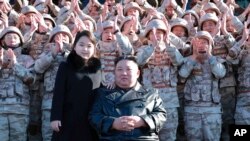On October 16, President Volodymyr Zelenskyy presented to the Ukrainian parliament, Verkhovna Rada, a road map to defeating the Russian aggression dubbed Victory Plan, details of which Kyiv keeps secret.
Zelenskyy told the country’s lawmakers that a triumvirate of “Russia, Iran and North Korea" is at war with Ukraine, and that Kyiv sees "an increasing alliance between Russia and regimes like North Korea … This is no longer just about transferring weapons. It is actually about transferring people from North Korea to the occupying military forces."
Iran has been providing Russia with military aid for more than two years, including deadly Shahed drones used in daily swarm attacks against Ukrainian civilians.
Despite the bulk of evidence, both Russia and Iran denied, falsely, Tehran’s aiding of Moscow’s aggression in Ukraine.
The news about the North Korean military presence in Russia and Ukraine only emerged during the last few weeks.
The Kremlin dismissed the reports. Russian presidential press secretary Dmitry Peskov called North Korean military direct involvement in the war an informational “canard” — a metaphor for fake news.
"This is not only British intelligence, it is also American intelligence. They report it all the time, they don't provide any evidence," Peskov said on October 16.
Earlier in Moscow, Peskov told Russian news agencies: “This [North Korean troop deployment to Russia's war in Ukraine] seems yet another information canard.”
The claim is likely false.
Ukrainian media reported the death of at least six North Korean soldiers in a Ukrainian drone strike on the Russian positions in the occupied Donetsk region on October 3.
South Korea’s Defense Minister Kim Yong-hyun said the reports about North Korean troops killed in Ukraine are “highly likely true” and that Seoul expects Pyongyang sending more troops to fight for Russia.
“We assess that the occurrence of casualties among North Korean officers and soldiers in Ukraine is highly likely, considering various circumstances,” he told the South Korean parliament on October 8, Defense Post reported.
On October 16, NATO said it can’t confirm the deployment of North Korean troops to war in Ukraine “at this stage.”
"What we do know is that North Korea is helping to fuel Russia's war effort against Ukraine. We strongly condemn the deepening military cooperation between Russia and North Korea,” NATO Secretary General Mark Rutte said.
Ukrainian intelligence said Russia is training some 3,000 North Korean infantry soldiers for combat to join the front lines in Ukraine by the end of the year, The Washington Post reported on October 11.
BBC reported that the question is not whether Pyongyang deployed troops to aid Russia’s war but how many of them are already on the front lines or in the training camps and getting ready for deployment.
News outlets in Ukraine, including the Kyiv Independent, on October 15 cited intelligence sources that the Russian military is trying to conceal an ongoing search for the 18 North Korean deserters who abandoned their posts in Kursk and Briansk regions.
North Korea has been supplying Russia with ballistic missiles and ammunition but Pyongyang’s provision of military manpower would “indicate a new level of desperation for Russia as it continues to suffer significant casualties on the battlefield in its brutal war against Ukraine,” White House National Security Council spokesperson Sean Savett said on October 15.
This development signifies an intensifying military cooperation between North Korea and Russia, Savett said.
On October 14, Russian President Vladimir Putin asked Parliament to ratify the mutual defense pact he signed with North Korea’s Kim Jong-un earlier this year.
Kim’s visit to Russia in 2023 confirmed a secret arms deal that resulted in significant deliveries of North Korean munitions that were crucial to Russia's summer offensive, The Guardian reported on October 10. In addition to the munitions, North Korea is likely seeking to gain combat experience and test its weapons in a war, although the quality of its weapons remains questionable.
War in Ukraine gives North Korea a unique opportunity to get “feedback from a real battlefield” on the combat performance of its weapons, ammunition, capabilities and personnel, enabling them to make adjustments, said General Charles Flynn, U.S. Army's Indo-Pacific commander.
North Korean military engineers and soldiers have been already deployed to Russian-occupied eastern Ukraine since 2022 to assist with operating of the KN-23 missile systems. North Korea also dispatched civilian workers to aid reconstruction efforts in the Donbas region.





